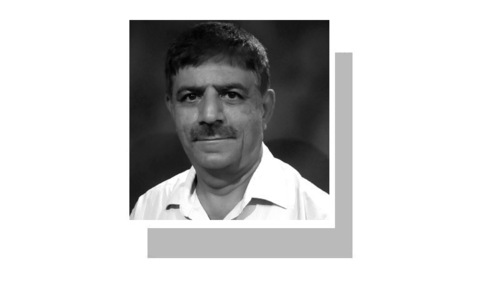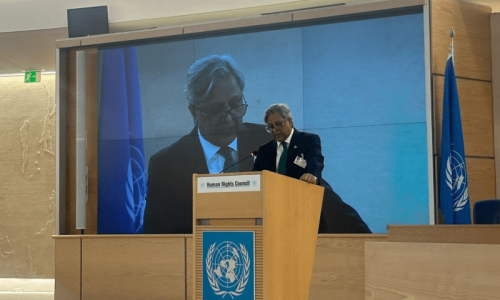BALOCHISTAN is on the boil again and precious lives continue to be lost in the province, with little or no acknowledgement that the so-called iron-hand policy being pursued there since the killing of Nawab Akbar Bugti in 2006 has delivered nothing but spiralling death and destruction.
Five handsome young men in uniform (as their posthumously published photos demonstrate) — Capt Muhammad Fahad Khan, Lance Naik Muhammed Imtiaz, Sepoy Mehran Abbas, Sepoy Asghar ud din and Sepoy Muhammad Shamoon — offered the ultimate sacrifice this last Sunday alone.
The policy pursued so far has inflicted considerable pain and agony on the law-enforcement personnel and the Baloch population alike. While the paramilitary forces are armed with the ‘writ of the law’ in taking on the ‘terrorists’, the general Baloch public is furious at being treated like a hostile, alien presence on their own soil.
The tragic state of play today is rooted in the shoot-from-the-hip attitude of the then military ruler Gen Pervez Musharraf, who received appalling counsel from a belligerent and, some say, unstable intelligence chief, a relative of his, and opted for a military operation when other options existed in 2006. Chaudhry Shujaat Husain and Mushahid Hussain Syed, seen as pro-establishment, had made considerable headway in defusing the crisis and negotiating with the tumandar of the Bugtis in his Dera Bugti home for a peaceful end to the confrontation.
The confrontation was triggered by the rape of a young woman doctor in Sui, who pointed a finger of blame at an army captain. This enraged Nawab Bugti, because he felt he was responsible for the safety of all under his protection in the Sui-Dera Bugti area.
The Baloch are furious at being treated like an alien presence on their own soil.
With Bugti demanding action against the young officer, the military ruler would not even order an inquiry, and instead declared the alleged perpetrator ‘innocent’. To this day, it isn’t clear what the general based his verdict on.
The result is what we have today — an innumerable number of young Baloch men have either been killed in firefights with the security forces or have been the victims of enforced disappearances and gone missing without a trace.
There was a time when a kill-and-dump policy was rampant, and every month a number of tortured, tormented bodies of young Baloch men, gone missing, were found dumped with their names pinned on them, in all probability as a ‘warning’ to others.
After Musharraf jettisoned the Shujaat mission and preferred an operation that killed the 79-year-old, infirm Baloch tribal leader, there was no attempt at a negotiated settlement to the simmering conflict and it was allowed to continue. In fact, up to 2006, all challenges to Islamabad-Rawalpindi rule were led by sardars and their tribal followers, and were mainly concentrated in the Bugti and Marri areas. Bugti’s killing sparked anger and insurgency elsewhere too.
Ironically, the ‘act tough’ policy has led to such disenchantment among the Baloch youths that today, the zone of conflict has extended way beyond the tribal belt to coastal areas, where traditionally the sardars have little influence. The militant leadership is said to have shifted into the hands of the middle class.
One attempt to cool things and deal politically with issues was made after Nawaz Sharif’s PML-N entered into an alliance with the Hasil Khan Bizenjo-led National Party following the 2013 elections and Dr Abdul Malik Baloch became the coalition chief minister in Quetta. Dr Baloch was mandated to make contact, and some preliminary discussions took place between the chief minister, the PML-N’s federal minister, retired Lt-Gen Qadir Baloch, and Brahmdagh Bugti, who was in exile in Switzerland. This triggered some optimism.
However, within weeks, Bugti complained in a television interview that he waited after the initial contact as he was willing to talk, but nobody from the government team followed up. It does not take much to figure out who was unenthusiastic about the talks and may have, in fact, vetoed them.
Over the past decade, the security policy has not delivered foolproof security. One of the main reasons has to be the alienation of large chunks of the civilian population. It is always a guerrilla tactic to provoke security forces into clamping down on civilians so as to drive a wedge between the two.
That is what has happened. I will concede it has been a long time since I have had the opportunity to travel across the beautiful land, but conversations with Baloch friends, sources and contacts of different hues make me feel truly depressed. The scenario is dismal.
A major policy flaw is that no attempt has been made to draw up even a list of reconcilable Baloch leaders/groups and tell them apart from the irreconcilables. If this is done, some movement towards talks with the former can be made as also an attempt to isolate the latter.
The writer is a former editor of Dawn.
abbas.nasir@hotmail.com
Published in Dawn, December 27th, 2022











































